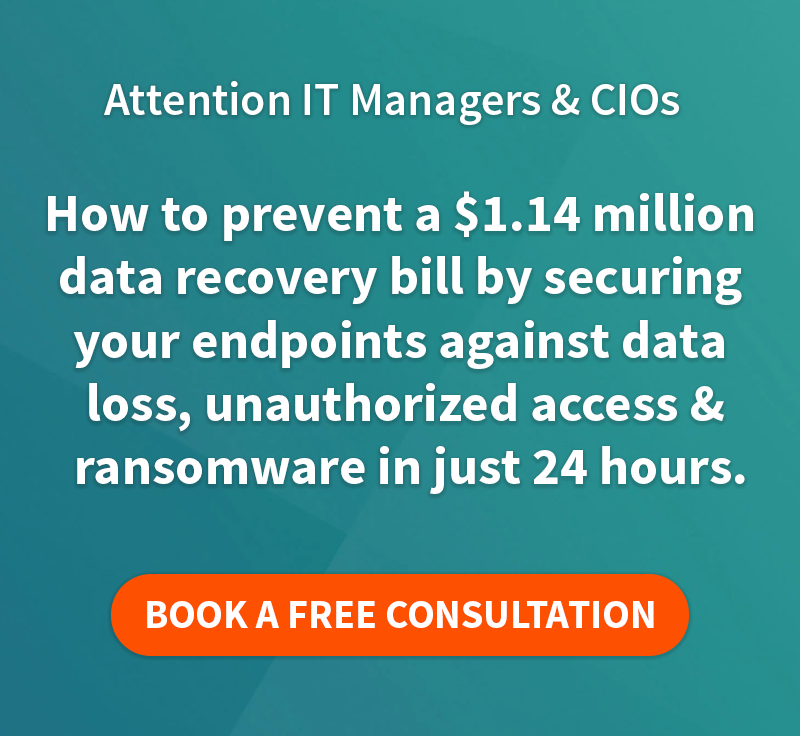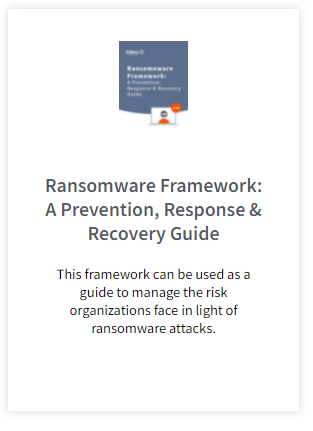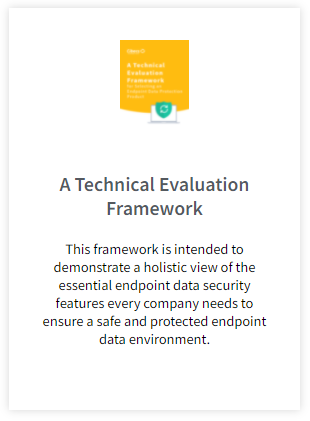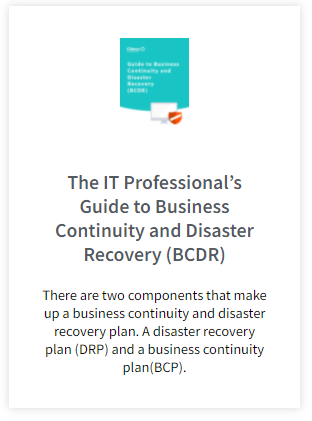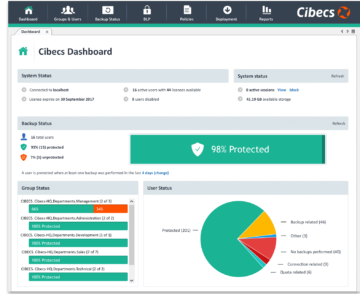The best way to protect yourself, your users and your business against ransomware is by setting up a proactive defence. The ransomware statistics paint a frightening picture for anyone in charge of IT: In Q3 2016 alone, 18 million new malware samples were captured. Source: Panda Labs What that means is that the criminals…
Cibecs vs Legacy Solutions
In their latest report on endpoint user data backup (ID #: G00211731), Gartner highlights the issue of endpoint user data security as one of the major problems faced by IT today.
One of the key data backup management problems being that IT tends to look at user data protection in the traditional sense, meaning from the centre out, instead of from the edge, inward – with the main areas of risk and exposure residing on endpoint user devices such as laptops and desktops.
Issues with this mindset
Corporate data loss grows exponentially each year, which means that data at the edge of the network has never been more exposed. Loss is happening at a higher rate with data intake doubling every 18 months.
The fact of the matter is that today’s legacy solutions struggle to provide an answer to the problem of endpoint data protection because vendors attempt to adapt antiquated technology, instead of building the correct solution from the ground up.
Some business backup management statistics to consider
- Data doubles every 18 months
- At least 14% of corporate employees now work remotely
- At least 28% of all corporate data resides exclusively on its laptops (and increasingly on other endpoint devices). This is alarming because it opens the user (and company) to one point of failure.
- More often than not, data lost from laptops (or desktops) cannot be recovered at all.
Issues with legacy solutions as highlighted by our existing customers:
the need for a corporate-wide, seamless, scalable endpoint user data backup solution becomes obviousBandwidth use (old solutions do not address its abusive and unnecessary use to an acceptable standard)
- Bandwidth use (old solutions do not address its abusive and unnecessary use to an acceptable standard)
- Gap between bandwidth availability and growth of data influx is ever increasing
- Trying to backup 100s or 1000s of users and keep data available (prior to archive) requires masses of data centre storage – this necessitates a massive reduction in data backup size.
- Bandwidth required to move this amount of data back to the data centre from endpoint devices is a big problem.
- Corporate IT has to manage expanding mobile users (and data sources), this necessitates that IT has a solution in place to swiftly recover user data and ensure business continuity.
Requirements of an effective endpoint user data backup and recovery solution: When comparing Cibecs to other Solutions
- The solution must allow centralized backup management
- The solution must be non-intrusive and invisible to users
- The solution must optimize storage and bandwidth use.
- The solution must be effective for remote data/branch office use
- The solution must deliver quick and easy data recovery
Limitations of most existing (legacy) solutions:
- Antiquated mindset (based on mainframe and tape while endpoint devices such as laptops and desktops are an afterthought)
- Antiquated technology
- Relies on Server-triggered backups
- Dependence on low latency, low noise, high bandwidth and secure networks
- Not built from the ground up for protecting the data on endpoint devices in an enterprise environment
Gartner’s key findings:
- Organizations are waking up to the fact that they have important data resident on endpoint devices that is not adequately protected, but should be.
- Endpoint backup implementations are most often driven and managed by the desktop/laptop management team in an organization, and, in some cases, this team is not even aware of what’s being used in the data centre for data protection.
- Options for endpoint backup abound, but not all products offered for desktop/laptop backup were initially designed with this type of device in mind.
- Most small endpoint data protection vendors offer their products as an on-premises solution and as a hosted service.
- For true data protection and recovery, IT should not leave endpoint backup to the user, because users won’t reliably do it.
- Organizations should leverage data centre backup modernization projects to include a strategy and solutions for endpoint data protection.
- Include products from new, emerging endpoint backup vendors, in addition to established vendors, on your shortlist when evaluating on-premises solutions.
- Look for products and services that offer functionality specific to endpoint devices, paying close attention to features related to endpoint CPU utilization and data reduction capabilities, and those that do not require user involvement in the backup process.
Gartner’s Backup Management Recommendations:
- For true data protection and recovery, IT should not leave endpoint backup to the user, because users won’t reliably do it.
- Organizations should leverage data centre backup modernization projects to include a strategy and solutions for endpoint data protection.
- Include products from new, emerging endpoint backup vendors, in addition to established vendors, on your shortlist when evaluating on-premises solutions.
- Look for products and services that offer functionality specific to endpoint devices, paying close attention to features related to endpoint CPU utilization and data reduction capabilities, and those that do not require user involvement in the backup process.
Want to know more?
Read our quick blog on Centralized Data Backup Management Software
You can also watch our overview video that illustrates the importance of automated backup software: Cibecs Data Backup Overview
FEATURED POSTS
IT Managers: How to Protect Your Users Against Ransomware
The best way to protect yourself, your users and your business against ransomware is by setting up a proactive defence. The ransomware statistics paint a frightening picture for anyone in charge of IT: In Q3 2016 alone, 18 million new malware samples were captured. Source: Panda Labs What that means is that the criminals…
Cibecs Joins Silicon Valley Top 20
Cibecs Joins Silicon Valley Companies to be Listed on Top 20 Most Promising Storage Solution Providers Cibecs, a leading South African endpoint backup, protection and security solution, has been recognised as one of the 20 Most Promising Storage Solutions by CIO Review. The list, compiled by industry insiders, highlights leading global technology providers that offer effective…
4 Signs You Need a New Endpoint Data Backup Solution
With more workers depending on laptops it is more important than ever to ensure that the work protected and stored on those devices is backed up and protected. Forrester Research says that 45% of corporate executives don’t follow policies for data use and handling. Underlining how at risk almost half of a business’s data actually…


